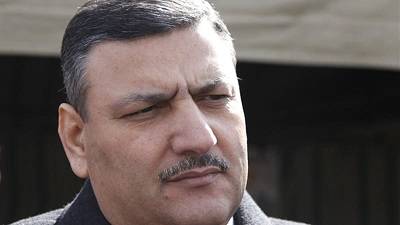Riyad Hijab, the head of Syria's main opposition bloc, has resigned before a conference scheduled in Saudi Arabia aimed at "unifying" various groups opposing Bashar al-Assad.
A former prime minister under Assad who defected following the 2011 uprising, Hijab has been the face of the Saudi-backed High Negotiations Committee (HNC) since December 2015.
He announced his decision to step down on Monday, without explaining the reasons for his move.
"After close to two years of hard work to preserve the glorious principles of the Syrian revolution [...] I find myself forced to announce my resignation from the HNC, wishing it good luck, and wishing peace and security to my beloved country, Syria," Hijab said in a statement posted on social media.
His resignation comes two days before an "expanded" Syrian opposition conference in the Saudi capital, Riyadh, announced in a statement on the state-run Saudi Press Agency (SPA).
The aim of the meeting, according to SPA, is to "bring the platforms and parties of the Syrian opposition closer" to one another and to "unify the opposition delegation" in the next round of United Nations-sponsored talks in Geneva.
The divisions within the opposition have long been a point of contention. Staffan de Mistura, the UN envoy to Syria, has previously insisted that the groups unite in negotiations with the Syrian regime.
Although the SPA statement did not specify which opposition groups would take part in the talks, the main divide within the opposition has been between the HNC and two dissident groups, the Moscow and Cairo platforms.
The Moscow and Cairo groups have close links to Russia and are tolerated by the regime of Assad for their softer stance towards it.
Their positions on the war in Syria makes them markedly different from the HNC, which has called for the removal of Assad as the basis for any solution to the conflict.
While it is unclear whether Hijab's resignation was linked to Saudi Arabia's planned conference, Omar Kouch, a Syrian analyst with close ties to the opposition, argued that the move was "a rejection of what is going to happen in Riyadh and the alienation of the HNC".
"They are enforcing international agendas - and specifically Russia's - onto the opposition, so how can they accept this?" Kouch told Al Jazeera from the Turkish city of Istanbul.
"They are trying to create a new opposition platform by adding the Moscow and Cairo groups - Hijab should have resigned a week ago when the meeting was announced," he added.
Since its entry into the Syrian war on the side of Assad in September 2015, Russia has simultaneously come to dominate in the diplomatic arena and steer negotiations on finding a solution to the conflict.
Along with Iran, which also backs Assad, and Turkey, a supporter of the opposition, it has led talks in Kazakhstan since the end of last year.
Kouch believes that following the Syrian army's battleground victories over the armed opposition, with Russian and Iranian help, the international community is attempting to force the rebels to accept a deal without the removal of Assad or a transitional period.
Since the start of the war in 2011, the Syrian regime has systematically refused to entertain any prospect of a transition that entails the removal of Assad, while, for the opposition, this step remains the only option for peace.
PHOTO CAPTION
Riyad Hijab, the head of Syria's main opposition bloc
Al-Jazeera


 Home
Home Discover Islam
Discover Islam Quran Recitations
Quran Recitations Lectures
Lectures
 Fatwa
Fatwa Articles
Articles Fiqh
Fiqh E-Books
E-Books Boys & Girls
Boys & Girls  Articles
Articles










